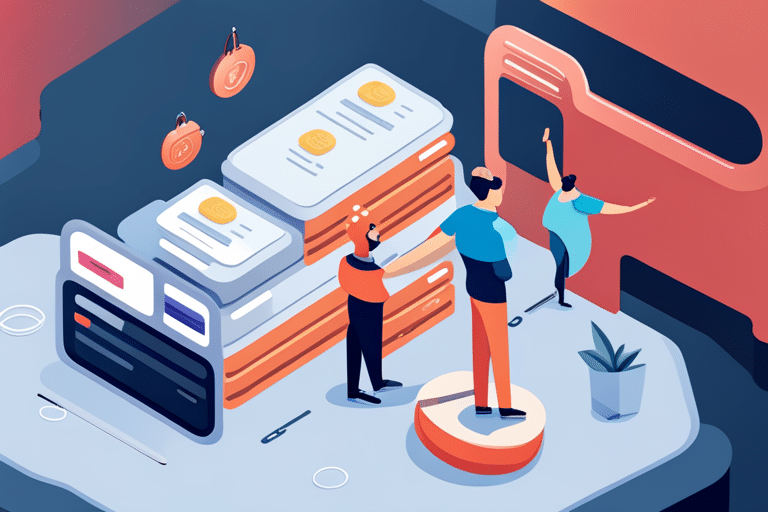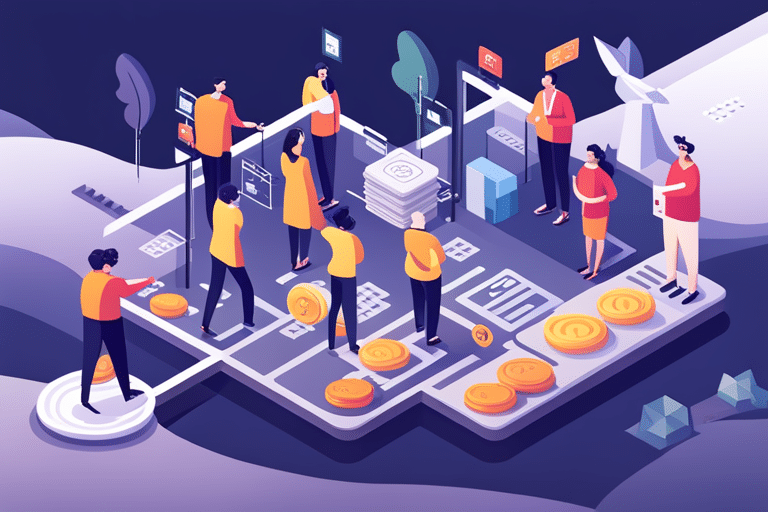Hey there, ready to dive into the fascinating world of debt consolidation?
Imagine this – you’re juggling multiple credit card bills, student loans, and maybe even a pesky car payment. It feels like you’re wrangling an unruly circus of financial obligations.
But fear not! Debt consolidation swoops in like a superhero to save the day.
In this article, we’ll demystify the pros, cons, and inner workings of debt consolidation so you can become a master of your own financial destiny.
Let’s get started!
Key Takeaways
- Debt consolidation simplifies finances and makes it easier to manage debts.
- It combines all debts into one single monthly payment, potentially lowering the overall interest rate.
- Debt consolidation provides a clear roadmap to becoming debt-free faster.
- However, it may require collateral and have associated fees.
Understanding Debt Consolidation

If you’re struggling to keep up with multiple loan payments, debt consolidation can help simplify your finances and make it easier to manage your debts. But before you dive headfirst into the world of debt consolidation, let’s take a closer look at the pros and cons.
First, let’s talk about the pros. Debt consolidation allows you to combine all of your debts into one single monthly payment. This means no more juggling multiple due dates or getting confused by different interest rates. It can also potentially lower your overall interest rate, saving you money in the long run. Plus, it gives you a clear roadmap to becoming debt-free faster.
On the flip side, there are some cons to consider as well. Debt consolidation may require collateral such as a home or car, which puts your assets at risk if you cannot make payments. Additionally, there may be fees associated with consolidating your debts that can add up over time.
So, is debt consolidation right for you? Well, it depends on your individual situation and goals. If simplifying your finances and reducing interest rates sounds appealing, then it might be worth exploring further. Just remember to weigh the pros and cons carefully before making any decisions!
The Benefits of Debt Consolidation

You can reap the benefits of debt consolidation by simplifying your monthly payments and potentially lowering your interest rates. It’s like tidying up your financial mess with a magic wand! Here are four incredible advantages of consolidating debts:
-
Streamlined Payments: No more juggling multiple due dates and amounts – with debt consolidation, you only have one payment to worry about each month. Say goodbye to confusion and hello to simplicity!
-
Lower Interest Rates: Consolidating your debts may allow you to secure a lower interest rate than what you were previously paying. That means more money in your pocket and less lining the pockets of those pesky creditors.
-
Improved Credit Score: By making timely payments on your consolidated loan, you can boost your credit score over time. Imagine watching that little number rise like a superhero soaring through the sky!
-
Reduced Stress: Debt can be overwhelming, but consolidating it can bring peace of mind. With just one manageable payment each month, you’ll feel lighter, freer, and ready to take on the world (or at least those remaining debts)!
Drawbacks of Debt Consolidation

Don’t overlook the potential drawbacks of debt consolidation, as it may not be the best solution for everyone. While there are definitely benefits to consolidating your debts into one manageable payment, there are also some risks and alternatives you should consider.
Let’s take a closer look at the potential drawbacks of debt consolidation:
| Drawbacks | Risks | Alternatives |
|---|---|---|
| Extended Repayment Terms | High Interest Rates | Debt Management Programs |
| Potential for More Debt | Impact on Credit Score | Snowball Method |
| Fees and Costs | Limited Eligibility | DIY Budgeting |
| Temptation to Reuse Credit | Potential Loss of Collateral | Bankruptcy |
| Inability to Change Spending Habits | Negative Impact on Relationships | Negotiating with Creditors |
As you can see from the table above, debt consolidation isn’t without its downsides. It’s important to weigh these factors against the potential benefits before making a decision.
If you’re not sold on debt consolidation, don’t worry! There are alternative options available. Consider exploring debt management programs or trying out the snowball method. You could also take matters into your own hands by creating a budget and sticking to it religiously.
Exploring Different Debt Consolidation Options

Are you caught in a web of debt and looking for a way out? Well, fear not! In this discussion, we will delve into the exciting world of different debt consolidation options.
Get ready to explore the epic battle between Loans and Balance Transfers, discover the secret behind Secured and Unsecured Loans, and unravel the mysterious realm of Interest Rates Comparison.
Loan Vs. Balance Transfer
When considering debt consolidation options, it’s important to compare the benefits and drawbacks of a loan versus a balance transfer. Let’s break it down for you, oh master of financial wizardry!
- Loan Options:
- Loans offer a fixed interest rate, making it easier to budget.
- You can choose from various loan terms that fit your needs.
-
It allows you to consolidate multiple debts into one convenient payment.
-
Balance Transfer Fees:
- Balance transfers may come with an introductory 0% APR for a limited time.
- However, watch out for sneaky balance transfer fees that could eat into your savings.
Secured Vs. Unsecured Loans
If you’re considering taking out a loan, it’s important to understand the differences between secured and unsecured loans.
Let’s dive into this magical world of borrowing money!
Picture yourself walking through a fantastical forest filled with loan options.
On one side, you have secured loans, guarded by mighty financial institutions. These loans require collateral, like your house or car, as protection for the lender in case you can’t repay.
It’s like leaving your most prized possession at Hogwarts for safekeeping!
On the other side, we have unsecured loans, floating in the air like enchanted balloons. These loans don’t need any collateral but often come with higher interest rates since lenders are taking on more risk.
Think of them as those daring wizards who perform spells without any safety nets!
Interest Rates Comparison
To compare interest rates, you should start by researching different lenders and their current rates. It’s like going on a quest for the best deal, but instead of slaying dragons, you’re slaying high interest rates!
Here are four factors to consider when comparing those sneaky numbers:
-
Annual Percentage Rate (APR): Look beyond the flashy introductory offers and focus on the APR. This includes both the interest rate and any additional fees.
-
Loan Term: A longer term may mean lower monthly payments, but it also means paying more in interest over time. Find that sweet spot between manageable payments and saving money.
-
Fixed vs Variable Rates: Are you a risk-taker or a stability seeker? Fixed rates stay consistent throughout your loan term, while variable rates can fluctuate based on market conditions.
-
Credit Score Impact: Applying for multiple loans can ding your credit score temporarily. So be strategic in your comparison shopping to minimize any negative effects.
How Debt Consolidation Works

Debt consolidation works by combining multiple debts into a single monthly payment. It’s like gathering all your wild, unruly debt children and putting them in one neat row. Ahh, the joy of organization! So, how does this magical process work?
Step 1: Assess your situation. Take a deep breath and face your debts head-on. Write down all the outstanding balances, interest rates, and due dates. It may seem overwhelming at first, but remember, you’re the captain of this ship!
Step 2: Explore your options. There are different ways to consolidate your debt – through a personal loan, balance transfer credit card, or home equity loan. Each has its pros and cons, so weigh them carefully.
Step 3: Choose a method that suits you best. Are you more of a ‘one-size-fits-all’ kind of person? A personal loan might be just what you need. Or maybe you enjoy juggling multiple cards (not recommended for actual juggling). In that case, a balance transfer credit card could be perfect.
Step 4: Apply for the chosen method and wait for approval (fingers crossed!). Once approved, use the funds to pay off your existing debts and focus on repaying just one monthly installment.
Voila! You’ve successfully consolidated your debt like a pro! Now sit back, relax (but not too much), and watch as those debts become nothing more than distant memories in no time.
Remember: mastering the art of debt consolidation takes patience and discipline. Stick to your new repayment plan like glue and soon enough you’ll be singing ‘I’m debt-free’ from every mountaintop!
Factors to Consider Before Consolidating Your Debt

Before diving into the world of debt consolidation, it’s important to evaluate your current financial situation. You don’t want to jump headfirst into something without considering all the factors. So, let’s take a moment to weigh the pros and cons.
Here are four things to consider before consolidating your debt:
-
Interest Rates: Take a look at the interest rates on your current loans and credit cards. Are they higher than what you could get with a consolidated loan? If so, that’s a point in favor of debt consolidation.
-
Monthly Payments: Consolidating your debt can simplify things by combining multiple payments into one. But make sure that new payment fits comfortably within your budget. You don’t want to trade one headache for another.
-
Credit Score: Debt consolidation can have both positive and negative effects on your credit score. On one hand, it may improve if you’re able to make consistent payments on time. On the other hand, opening a new account could temporarily lower it.
-
Benefits vs drawbacks: Consider weighing the benefits against any potential drawbacks of debt consolidation such as fees associated with obtaining or maintaining the consolidated loan, and lengthening the duration of the repayment period.
Steps to Take to Consolidate Your Debt

So you’ve decided to tackle that mountain of debt, but now you’re faced with the daunting task of choosing the right method to consolidate it all. Don’t worry, we’ve got your back!
In this discussion, we’ll explore various methods and help you find the one that suits your financial needs like a perfectly tailored suit.
Plus, we’ll also dive into the impact these methods can have on your credit score because let’s face it, credit scores can be as mysterious as unicorns.
Choosing the Right Method
When considering debt consolidation options, it’s important to choose the method that best suits your financial situation. After all, you want to find a solution that will help you climb out of debt without feeling like you’re just digging yourself into a deeper hole.
So, let’s break it down for you in plain English and sprinkle in some whimsy along the way!
Here are four key factors to consider when deciding between a loan and a credit card, as well as whether to opt for a fixed rate or variable rate:
-
Loan vs. Credit Card: Loans typically offer lower interest rates than credit cards, making them an attractive option if you have substantial debt.
-
Fixed Rate: A fixed-rate loan ensures that your interest rate stays the same throughout the repayment period, providing stability and predictability in your monthly payments.
-
Variable Rate: With a variable-rate loan, your interest rate can fluctuate over time based on market conditions – this could lead to savings if rates go down but may increase your payments if rates rise.
-
Credit Card: On the other hand, using a balance transfer credit card allows you to consolidate multiple debts onto one card with an introductory 0% APR period.
Remember: every financial situation is unique! Take the time to assess your needs before choosing which consolidation method is right for you.
Happy consolidating!
Impact on Credit Score
Choosing the right debt consolidation method can have a significant impact on your credit score, my friend! It’s like choosing the perfect outfit for a fancy party – you want to make sure it suits you and makes you look good. Just like that, picking the right debt consolidation method can enhance your creditworthiness and have long-term financial benefits.
When you consolidate your debts, it shows that you’re taking control of your finances. This responsible behavior can boost your credit score over time. Plus, by combining multiple debts into one manageable payment, you reduce the risk of missing payments or defaulting. And guess what? That’s music to lenders’ ears!
However, be aware that some methods may temporarily lower your credit score before improving it in the long run. But don’t fret! As long as you stay committed to making timely payments and managing your finances wisely, those temporary dips will be worth it for the positive effect on your creditworthiness.
Tips for Successfully Managing Your Consolidated Debt

To successfully manage your consolidated debt, it’s important to create a realistic budget and stick to it. But fear not, brave warrior of finance! We shall embark on this whimsical journey together and conquer the realm of debt repayment strategies.
-
Track Your Spending: Keep a close eye on your expenses like a hawk with laser vision. Categorize them into ‘must-haves’ (like food and shelter) and ‘nice-to-haves’ (like that fancy coffee). This will help you prioritize where your hard-earned gold coins go.
-
Cut Back on Luxuries: While slaying dragons may be exciting, resist the temptation to splurge on unnecessary luxuries for now. Focus on reducing non-essential expenses until you feel victorious over your debt.
-
Negotiate with Lenders: Don’t be afraid to channel your inner negotiator! Reach out to your lenders and see if they’ll lower interest rates or provide more flexible payment terms. You never know what magic spells they might conjure up!
-
Celebrate Small Victories: Every step forward is worth celebrating! Reward yourself when you reach certain milestones in your debt repayment journey, like paying off a credit card or making consistent payments for six months straight.
Frequently Asked Questions
Can I Consolidate All Types of Debt With a Debt Consolidation Program?
Yes, you can consolidate all types of debt with the right program. Different loans like credit card debt, student loans, and medical bills are eligible. Just choose the program that suits your needs!
Will Debt Consolidation Affect My Credit Score?
Will debt consolidation affect your credit score? Well, it’s like a magic trick – it can make your credit score disappear for a bit, but then it reappears stronger than ever! So, don’t worry too much.
What Happens to My Credit Cards After I Consolidate My Debt?
Once you consolidate your debt, it’s time to bid adieu to those pesky credit cards. They can still be used for emergencies, but focus on managing your financial obligations and keeping that credit utilization low!
How Long Does It Usually Take to Pay off Consolidated Debt?
When you consolidate your debt, the timeline for paying it off can vary. Some people may take a few years, while others may need longer. It all depends on your repayment strategies and financial situation.
Are There Any Alternatives to Debt Consolidation That I Should Consider?
When it comes to dealing with debt, you’ve got options! Debt management programs and debt settlement programs are two alternatives to consider. Let’s explore these paths and find the best one for you!
Conclusion
So there you have it, my friend! Debt consolidation can be a magical wand that helps you wave goodbye to your financial worries.
With its pros and cons carefully considered, this wizardry of money management can bring harmony to your chaotic debt situation.
Just remember, Rome wasn’t built in a day, and neither will your debt disappear overnight. But with dedication and perseverance, you’ll be able to climb that mountain of bills like a graceful unicorn leaps over rainbows.
So go forth, conquer your debt dragon, and let the magic of consolidation guide you towards financial freedom!

